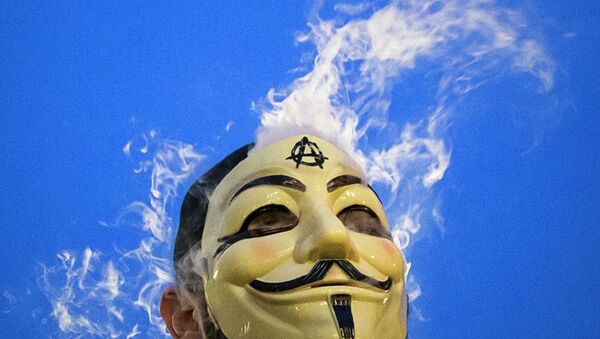MOSCOW, November 16 (Sputnik) — Roughly 40 federal agencies of the US government have conducted undercover operations, the scope of which has considerably widened during the past several years, as officers in disguise pretend to be businessmen, unemployed, social activists and professionals in different areas to infiltrate potentially criminal circles in their struggle for national security and proper law enforcement.
Federal agents, disguised as whoever you could imagine, have infiltrated many spheres of modern America’s life, according to a recent report of the New York Times. There seems to be no political event, street rally, fairly profitable economic activity or formal procedure without the presence of an undercover agent today. Would these reports add to the domestic espionage paranoia, or they must ensure peace of mind and sense of security in American citizens?
So far, neither effect is yet explicitly seen.
See, first and foremost, such practices mean that the bloated US government apparatus would need to regulate itself. Examples of undercover federal involvement can be found in many branches of the US government.
The Internal Revenue Service (IRS) is exploring new approaches to counter tax evasions shemes. Many undercover agents, pretending they are tax accountants of luxury goods dealers, creep into favour with suspected tax dodgers in order to obtain the court-ready evidence against them.
"We’re getting the information directly from the bad guys — what more could you want?" Thomas Hunker, an ex-police chief from Bal Harbour, FL, said as quoted by the NY Times.
Some 100 agents pretend to be social welfare recipients, of the Agriculture Department in particular, coming to convenience stores in order to single out malevolent retailers, involved in food stamps fraud.
There are plentiful other cases when disguised federal agents have infiltrated corrupt structures or become involved in suspicious practices. In supermarkets, actual underage persons are used to catch those who would unlawfully sell alcohol and cigarette. Diverse government-funded programs in education and healthcare sometimes involve financial fraud, thus, undercover agents pretend they are patients and educators to see whether the money circulate as planned.
"Done right, undercover work can be a very effective law-enforcement method, but it carries serious risks and should only be undertaken with proper training, supervision and oversight," Michael German, formerly of FBI and now of New York University’s Law school, told the NY Times. "Ultimately, it is government deceitfulness and participation in criminal activity, which is only justifiable when it is used to resolve the most serious crimes."
Previously, undercover work was undertaken primarily by the FBI with agents infiltrating organized crime and/or terrorist groups. But with as many different agencies involved now, it is fair to conclude that the US’ primary concern today is corruption, triggered by excessive governmental spending.
In some cases, undercover agents mingle with street protesters to prevent possible illicit activity. However, such practices concern civil rights activists who think this can lead to abuse. Their concern stems from the fact that the Feds undertake surveillance operation when there is no actual crime going on. No matter that a federal agent may be looking for petty thieves during an anti-government protest. These actions, if leaked, will be considered by the public as infringement on the civil liberties.
"There is a danger to democracy in having police infiltrate protests when there isn’t a reasonable basis to suspect criminality," German told the NY Times.
Undercover operations are not always successful, and as their scope broadens and more employees of different agencies are involved, the chances of their failure to grow exponentially. "There are all sorts of stories about undercover operations gone bad," Jeff Silk, of the Drug Enforcement Administration. "People are always tripping and falling over each other's cases."
There is a lot of confusion and uncertainty surrounding the governmental domestic undercover ops. The main issue is widespread lack of transparency, which triggers distrust between Americans and the federal government. Insufficient public accountability also contributes to the multiple conspiracy theories.


